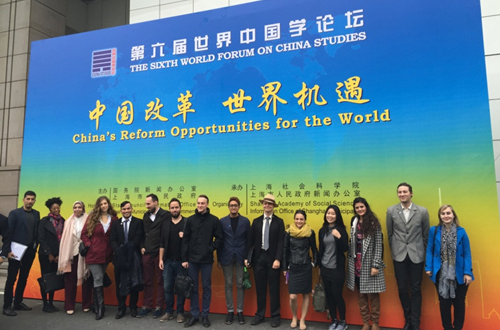QIAO ZHAOHONG: ‘China hands’ need better grip

The sixth World Forum on China Studies was held in Shanghai from Nov. 20 to 21. The flourishing of China studies is an indicator of the level of attention the world is paying to China.
The sixth World Forum on China Studies, themed “China’s Reform Opportunities for the World” was held in Shanghai from Nov. 20 to 21. In the past 20 years, interest in China studies has grown worldwide in tandem with the nation’s rising national status and global influence. Meanwhile, many “China hands,” a slang term for foreign-born experts on the country, have also emerged and are introducing China to the world through their own observations and analysis. However, the discipline of China studies still faces challenges in some countries.
In US academia, quite a few young scholars in the field of contemporary China studies are still making redundant arguments. This is far from the ideal that young researchers should verify, illustrate or overturn their predecessors’ conclusions based on systematic analysis of existing research results. Elizabeth Perry, an expert from the US, pointed out that US scholars in the field currently tend to restrict the scope of their research to the reform period after 1978, with a particular focus on the post-1989 era, resulting in a lack of familiarity with their predecessors’ research achievements. It is hard for political scholars to answer some crucial questions about contemporary Chinese politics without a deep understanding of the nation’s early political development.
Russia, a large country that has long been committed to China studies, is also showing relative weakness in this regard. In recent years, the field has been hampered by under-investment in humanities and social sciences, imperfect systems for managing academic talent, and an imbalance between the supply of and demand for related knowledge. As a result, the discipline has faced challenges in Russia, such as serious brain drain and talent aging, leading to a decline in the amount and quality of scholarship.
Japan has never stopped studying China since World War II. However, Japanese academia is plagued by poor imagination in bilateral understanding between China and Japan.
Due to limitations in research, academia cannot provide effective explanations and play the role of communication and coordination when relevant practical problems occur. For example, academics in China and South Korea have been emphasizing cooperation in research. However, they did not communicate and coordinate with each other when disputes on Koguryo history or the origins of the Dragon Boat Festival emerged, either keeping silent or misleading others.
Therefore, it is necessary to respect each other’s historical and cultural traditions and conduct cognitive activities based on a humanistic spirit in a bid to deepen mutual understanding.
Currently, awareness of China is ubiquitous. The flourishing of China studies is an indicator of the level of attention the world is paying to the rising Asian power. To really read and comprehend China, its history and realities need to be further understood. China should actively innovate its own discourse system and transmission mode, telling Chinese stories with a language that can be understood by others.
China’s unique historical road is determined by its special national conditions. The development process of the nation’s history is of great significance to the construction of its path. Only on the basis of the accurate understanding of these historical facts can people form the “Chinese-style thought” of China’s development process and open the door to more extensive research on Chinese issues. This requires scholars engaging in China studies not only to further understand the nation’s historical and cultural tradition but also to focus on deep analysis of its practical problems. Studies of China’s issues overseas therefore have a long way to go.
Qiao Zhaohong is a research fellow from the Institute of China Studies at the Shanghai Academy of Social Sciences.
